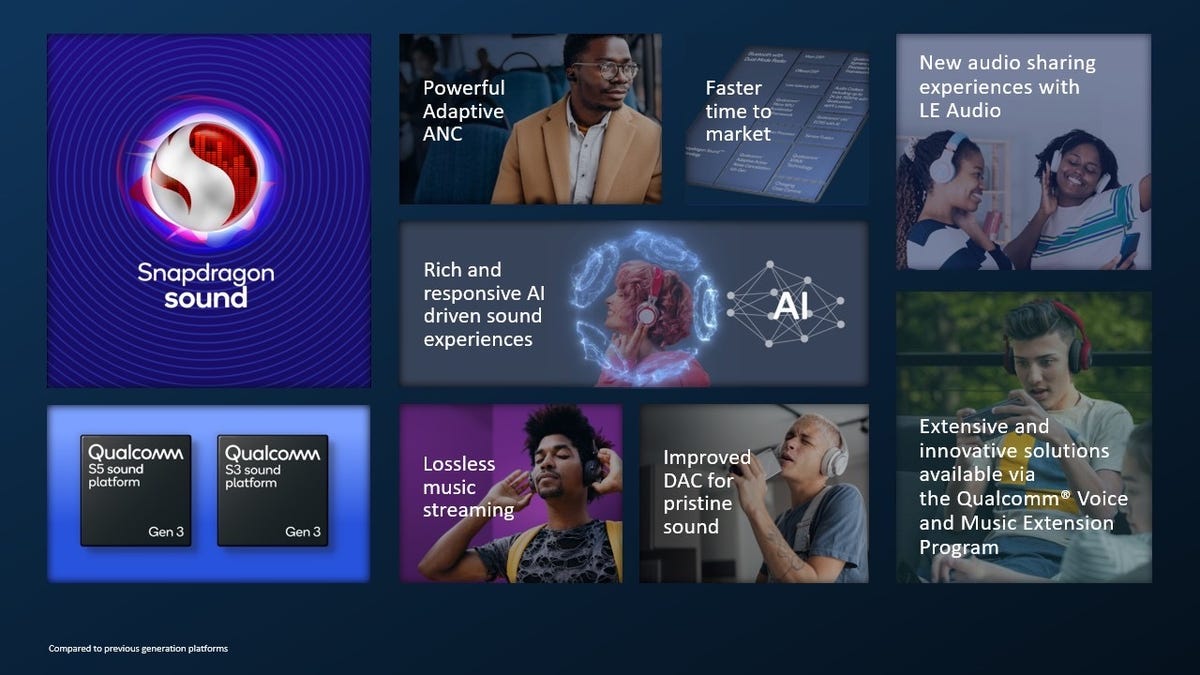Qualcomm has unveiled two new audio chips – Snapdragon S3 Gen 3 and Snapdragon S5 Gen 3 – aimed at improving the audio quality of mid- and high-end wireless earphones, headsets and speakers. They will allow manufacturers to offer superior sound quality, better active noise reduction and improved call quality on these products, while reducing their energy consumption.
Brands like Bose, Sennheiser, Anker and Jabra already use Qualcomm chips in their products. The two new chips, available soon, should allow them to improve the Bluetooth audio experience of their devices. Here’s how.
Qualcomm S5 Gen 3
Like most of this year’s innovations, Qualcomm’s new chips have features powered by artificial intelligence. More specifically, the third-generation Qualcomm S5 platform integrates an AI-based neural processing unit, which should in theory allow products integrating the chip to process features related to active noise reduction (ANC), transparency and manage external noise more quickly, more efficiently and with less energy consumption.
Qualcomm explains that the AI is able to listen to surrounding noise levels and “understand and adapt to the user’s needs throughout the day.” In this sense, AI should make the adaptive ANC of the new chips more intuitive and useful.

Image: Qualcomm.
Compared to the previous generation, the S5 Gen 2, the new chip will support 50% more memory and have double the computing power to process audio signals. Thus, products incorporating the new chip will enable better voice recognition, improved spatial audio and more precise equalization and noise reduction functions.
Thanks to its very low power consumption, the new chip should also extend the battery of audio devices. It can also contain up to 5 MB of RAM, compared to 2.64 MB for the previous generation: this increase in RAM should help reduce latency and increase throughput.
Of course, the S5 Gen 3 platform supports a series of Snapdragon AptX Bluetooth codecs to deliver lossless audio. Headsets equipped with these chips will support LE audio to improve bandwidth, and Auracast Bluetooth will provide access to multiple Bluetooth audio streams.
Qualcomm S5 Gen 3 chips will be reserved for high-end headsets and earphones, including those that already work with the Qualcomm S5 Gen 2 launched in 2022.
Qualcomm S3 Gen 3
The third generation Qualcomm S3 chips are aimed more at mid-range audio products.
The differences between the Qualcomm S3 Gen 3 and the previous generation, Qualcomm S3 Gen 2, are not many. Still, third-generation chips pack all the latest features into a single chip, which should ease the workload on manufacturers.
For the general public, this means that audio devices incorporating these chips will consume less power, be able to support lossless audio, and offer more seamless software updates and better software features. And this, without having to significantly increase your budget to upgrade to a high-end device.
The latest S3 platform offers improved internal digital-to-analog converters, enabling mid-range wireless headphones, headsets and speakers to support lossless music streaming at up to 24-bit/48kHz.
Such high audio quality was once reserved for high-end products, but these audio chips now enable more accessible Bluetooth speakers to achieve high-resolution audio.
How can I benefit from Aptx codecs?
Qualcomm presents AptX Adaptive as its most intuitive and scalable codec. However, to access this codec, all devices must be equipped with a Qualcomm chip. This is the biggest weakness of these new chips: your headset can be equipped with cutting-edge technology, its capabilities will depend on those of its connected peripherals. So, if you listen to music through your smartphone, your headphones equipped with the new Qualcomm chip will work better… if your smartphone is also equipped with a Qualcomm chip.
However, many smartphones use chips from other manufacturers, or opt for proprietary audio technology to avoid having to acquire a license for AptX codecs. To cite a few examples, at Apple, Apple iPhones use internal chips and proprietary Bluetooth technology. Samsung smartphones use Qualcomm chips, but a proprietary Bluetooth codec. As for Google’s Pixels, they support other AptX codecs that are not AptX Adaptive.
So, count on the next headsets or speakers equipped with new Qualcomm chips to offer improved audio quality and better noise reduction while preserving their battery and maintaining a better connection. But provided you have a compatible smartphone.
Source: ZDNet.com
